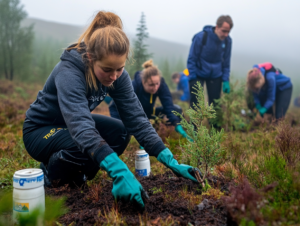Introduction to Sustainable Travel
Sustainable travel refers to a tourism approach that strives to minimize the environmental, social, and economic impact of travel. As global awareness about environmental issues, such as climate change, biodiversity loss, and resource depletion continues to rise, travelers are increasingly seeking ways to explore the world responsibly. This movement towards sustainable travel emphasizes a conscious decision-making process when choosing destinations, accommodations, activities, and modes of transportation. By prioritizing sustainable practices, travelers can significantly reduce their carbon footprint and contribute to the well-being of local communities.
A key aspect of sustainable travel is the preservation of ecosystems and biodiversity. Unregulated tourism can lead to the degradation of natural habitats and threaten wildlife populations. Travelers are encouraged to opt for eco-friendly accommodations, engage in low-impact activities, and participate in local conservation efforts to help mitigate these impacts. Additionally, sustainable travel advocates for respect towards local cultures and traditions, aiming to create a beneficial relationship between visitors and host communities. This ensures that tourism contributes positively to economic development and cultural preservation rather than exploiting these localities.
Furthermore, the growing trend towards sustainability in the travel industry has prompted businesses to adopt environmentally responsible practices, from carbon offsetting to supporting community initiatives. As 2025 approaches, it is expected that more travelers will prioritize sustainable options when planning their journeys. By making informed choices, individuals can play a crucial role in protecting the planet while enjoying enriching experiences. It is essential for all stakeholders, including travelers, governments, and businesses, to work collaboratively towards a future where travel enhances rather than harms the world we inhabit.

The Current State of Tourism and Its Challenges
The tourism industry, as of 2025, is grappling with a myriad of challenges that have evolved in response to both environmental concerns and the lingering impacts of the COVID-19 pandemic. Overtourism has emerged as a pressing issue, where popular destinations are overwhelmed by an excessive number of visitors. This phenomenon not only leads to overcrowding but also triggers detrimental effects on local ecosystems and communities. The balance between attracting tourists and preserving cultural and natural spaces is becoming increasingly difficult to achieve.
Moreover, carbon emissions linked with travel continue to be a significant concern for the industry. Air travel, which constitutes a substantial proportion of tourism-related emissions, exacerbates global warming, prompting calls for more sustainable practices. Among travelers and corporations, there is a growing awareness of the necessity to minimize carbon footprints. Strategies such as carbon offsetting, promoting eco-friendly accommodations, and utilizing carbon-neutral transport options are gaining traction as the sector aims to mitigate its environmental impact.
In the wake of the global pandemic, recovery strategies adopted by the tourism sector have also played a pivotal role in shaping sustainable practices. Many businesses are integrating sustainability into their recovery plans, recognizing that addressing tourism’s environmental footprint is essential for long-term viability. Initiatives such as the introduction of traveler caps in heavily visited areas, investment in renewable energy solutions, and the incorporation of preservation efforts for vulnerable ecosystems reflect a shift towards more responsible travel. As operators adapt to changing dynamics, the focus is shifting towards resilience, where the sustainable management of tourism resources ensures both ecological preservation and a delightful experience for travelers.
Ultimately, while the tourism industry faces significant challenges in 2025, the commitment to adopting more sustainable practices reflects a hopeful avenue for creating a balance between enjoyment and responsibility.

Principles of Responsible Travel
The pursuit of responsible travel is increasingly important in a world that is navigating the complexities of climate change and cultural preservation. It encompasses several core principles designed to ensure that travelers minimize their environmental impact, respect local cultures, support local economies, and preserve natural resources. By adhering to these principles, individuals can make informed decisions that contribute positively to the destinations they visit.
A primary tenet of responsible travel is minimizing one’s environmental footprint. This involves choosing eco-friendly transportation methods, such as trains or hybrid vehicles, over traditional, high-emission options. It also entails being mindful of energy consumption, such as opting for accommodations that practice sustainability, like using renewable energy sources and promoting water conservation. Additionally, travelers should avoid single-use plastics and prioritize products with environmentally friendly packaging, thus contributing to the reduction of waste generated during their journeys.
Respecting local cultures is another essential aspect of responsible travel. Cultural sensitivity includes understanding and honoring the customs, traditions, and beliefs of the communities visited. Engaging with locals through guided tours or cultural experiences can offer insights into their way of life while fostering mutual respect. Moreover, acquiring basic language skills can enhance interactions and signify respect for the host culture.
Support for local economies should be at the forefront of every traveler’s mind. Rather than relying on international chains, visitors are encouraged to eat at local restaurants, shop at markets, and utilize local guides. This not only bolsters the livelihoods of community members but also provides a more authentic experience of the destination. Finally, preserving natural resources is crucial; travelers should stick to marked paths in natural reserves and refrain from activities that harm wildlife or ecosystems.
Eco-Friendly Destinations to Visit in 2025
As the global focus on sustainability continues to rise, eco-friendly destinations are attracting more travelers who wish to minimize their environmental impact while exploring the world. In 2025, several locations stand out for their commitment to responsible tourism and environmental preservation. Choosing these destinations not only enhances one’s travel experience but also supports local initiatives aimed at protecting the planet.
One notable eco-friendly destination is Costa Rica, renowned for its remarkable biodiversity and extensive nature reserves. This Central American nation emphasizes sustainability through its eco-lodges and community-based tourism initiatives. Visitors can engage in activities such as hiking in national parks, participating in wildlife conservation programs, and enjoying organic farm-to-table experiences. Choosing to stay in certified eco-friendly accommodations helps contribute to local economies while fostering environmental stewardship.
Another excellent choice is Iceland, which has been leading the way in renewable energy use and sustainable practices. The country’s stunning landscapes, from geothermal springs to volcanic terrains, are perfect for the eco-conscious traveler. Besides exploring its natural wonders, visitors can participate in initiatives aimed at preserving these unique ecosystems, such as tree planting and wildlife protection programs. Additionally, Iceland boasts a commitment to reducing plastic waste, inviting travelers to get involved in local clean-up efforts.
Furthermore, New Zealand offers breathtaking scenery combined with a strong focus on sustainability. The country has established programs that promote ecological footprint reduction, like guided tours that educate visitors on preserving native flora and fauna. By participating in outdoor adventures, such as kayaking or hiking, travelers can learn about the importance of conservation while enjoying the pristine environment.
Ultimately, opting for eco-friendly destinations in 2025 enables travelers to experience the beauty of the world while ensuring that future generations can enjoy these wonders as well. Supporting locations that prioritize sustainability and responsible tourism contributes to a more sustainable planet for all.
Sustainable Transportation Options
In 2025, sustainable travel takes on a more significant role, particularly in transportation, which is a major contributor to global carbon emissions. A growing range of options allows travelers to explore their destinations responsibly while minimizing their environmental impact. One of the primary alternatives gaining traction is electric vehicles (EVs). Many rental services now offer EVs, which can significantly reduce greenhouse gas emissions compared to traditional gasoline-powered cars. This option not only lessens one’s carbon footprint but also supports the increasing infrastructure dedicated to charging stations, making EVs more convenient for long-distance journeys.

Public transit continues to be a vital resource for sustainable travel. Many cities have improved their public transportation systems, incorporating electric buses and trams that provide eco-friendly means to navigate urban landscapes. For travelers in metropolitan areas, using buses, trains, or light rail offers a budget-friendly and low-impact method to explore local attractions. It also stimulates economic growth by encouraging residents and visitors alike to utilize shared transport options rather than individual cars.
Another increasingly popular choice is cycling. Various destinations now provide bike-sharing programs, and bicycle lanes are being integrated into urban planning. Exploring new cities on two wheels not only promotes a healthier lifestyle but significantly reduces reliance on fossil fuels. Additionally, walking remains one of the most environmentally friendly methods of transportation and allows travelers to fully immerse themselves in their surroundings. For short distances, choosing to walk can lead to unexpected discoveries and a more intimate connection to the place being visited.
In selecting sustainable transportation options, travelers should consider the accessibility and availability of these methods within their chosen destination. By prioritizing eco-friendly travel, individuals can contribute to a positive shift towards greener tourism practices while enjoying their explorations responsibly.
How to Find Eco-Conscious Accommodations

As the travel industry continually evolves, selecting eco-conscious accommodations has become crucial for travelers looking to explore the world responsibly. One effective approach is to look for establishments that hold specific certifications indicating their commitment to sustainable practices. Certifications such as LEED (Leadership in Energy and Environmental Design), Green Globe, and EarthCheck can serve as reliable markers of an accommodation’s environmental efforts. These certifications often consider factors like energy efficiency, waste reduction, and sustainable sourcing of materials.
In addition to certifications, travelers can also explore different types of eco-friendly lodgings. Eco-lodges, for instance, typically emphasize sustainability by utilizing renewable energy sources, employing local staff, and incorporating natural materials in their construction. Green hotels, on the other hand, implement sustainable practices such as water conservation, recycling programs, and organic food offerings. When researching for accommodations, consider filtering your search by using dedicated eco-travel websites or platforms specifically highlighting sustainable options.
Furthermore, it is essential to ask pertinent questions to assess the eco-friendliness of any potential stay. Inquire about energy sources, waste management practices, and water conservation efforts. For example, does the property use solar panels or other renewable energy resources? Additionally, understanding how they manage waste, particularly regarding single-use plastics, can provide insight into their sustainability efforts. It may also be beneficial to check if the establishment engages in community initiatives, such as supporting local artisans or conservation projects. By considering these factors, travelers can ensure that their accommodations align with their values, contributing positively to the environment while enjoying their travel experiences.
Engaging with Local Communities
Engaging with local communities is a fundamental aspect of sustainable travel, allowing travelers to forge meaningful connections while fostering cultural appreciation and support for local economies. This practice emphasizes the importance of cultural sensitivity and respect for traditions, aiming to minimize any potential negative impact travelers may have on these communities. Understanding local customs, traditions, and social structures can enrich the travel experience and facilitate positive interactions.
Supporting local artisans plays a significant role in contributing to the sustainability of communities. Travelers can choose to purchase handcrafted goods, artworks, or traditional souvenirs directly from local artisans instead of mass-produced items. This not only provides financial support to local craftsmen but also helps preserve traditional skills and crafts that might otherwise be lost. Engaging with artisans through workshops or tours can provide travelers with insight into cultural practices and the importance of their craftsmanship.
Participation in community-based tourism initiatives is another effective way to engage with local residents. Many destinations offer programs where travelers can stay with local families, partake in educational tours, or volunteer on community projects. These initiatives allow visitors to understand the day-to-day lives of residents and promote a more immersive travel experience. Furthermore, such involvement can lead to lasting friendships and a deeper appreciation for local cultures.
To ensure interactions remain respectful and beneficial to locals, travelers should adopt a few best practices. Taking the time to learn basic phrases in the local language can demonstrate respect, while also helping to break down barriers between cultures. Additionally, being mindful of personal space and avoiding taking photographs without permission fosters mutual respect. By prioritizing these principles, travelers can ensure their engagements with local communities during their journeys contribute positively to both parties.
Sustainable Travel Activities and Experiences
As eco-conscious travelers seek to minimize their environmental footprint while maximizing meaningful experiences, engaging in sustainable travel activities can create lasting connections with nature and local cultures. One prominent option is participating in wildlife conservation projects. These initiatives often involve hands-on work aimed at protecting endangered species and restoring natural habitats. Travelers can volunteer their time in various programs worldwide, contributing to the preservation of biodiversity while learning about local environments and species directly from conservationists.
Another enriching avenue for sustainable travel lies in volunteer tourism, where individuals can immerse themselves in communities while offering valuable support. Activities may include teaching English, assisting in community development projects, or participating in agricultural efforts. Such interactions promote cultural exchange, foster mutual understanding, and empower local communities by providing resources and skills that enhance their resilience.
Nature hikes represent another popular and eco-friendly activity for travelers looking to explore the great outdoors. By opting for guided hikes in protected areas, tourists can enjoy the beauty of landscapes, from lush forests to stunning mountain ranges, while learning about ecological preservation from knowledgeable guides. Choosing trails that follow strict sustainability guidelines ensures that participants minimize their impact on these delicate environments and contribute to their upkeep.
Responsible wildlife encounters also play a significant role in sustainable travel, enabling travelers to engage with animals in their natural habitats while adhering to ethical practices. This includes participating in eco-tours that focus on observing animals without disturbing their routines or ecosystems. Such experiences allow travelers to appreciate wildlife in a respectful manner, fostering a deeper understanding of the importance of conservation efforts.
Ultimately, by undertaking these sustainable travel activities, tourists not only cultivate rich experiences but also contribute positively to the environments and communities they visit, ensuring that the beauty and integrity of our planet endure for future generations.
The Future of Sustainable Travel
The landscape of sustainable travel is set to undergo significant transformation in the coming years, especially beyond 2025. As awareness of environmental issues escalates, travelers increasingly seek experiences that minimize their ecological footprint. This shift in behavior is prompting the travel industry to innovate and adapt to a more responsible framework. One of the major trends expected to dominate is the integration of advanced technology into travel solutions. Innovations such as carbon offset platforms, eco-friendly transportation options, and smart accommodations will likely become mainstream, making it easier for travelers to make sustainable choices.
Additionally, regulatory policies at both international and local levels are anticipated to evolve, placing greater emphasis on sustainable practices within tourism. Governments may implement stricter guidelines for businesses that fail to adhere to eco-friendly standards, compelling hotels, airlines, and tour operators to prioritize sustainability. This regulatory shift could lead to the emergence of certification programs for eco-conscious travel services, providing consumers with clear options to support responsible tourism initiatives.
Travelers themselves will continue to drive the demand for sustainable options, with younger generations showing a profound commitment to environmental stewardship. As they prefer authentic experiences that reflect local culture while adhering to sustainable practices, travel brands will have to engage and educate their customers about their efforts in sustainability. This engagement can further strengthen brand loyalty and encourage travelers to advocate for responsible tourism.
In this evolving scenario, it becomes increasingly crucial for conscientious travelers to remain informed about sustainable travel developments. By keeping abreast of innovations, policies, and behavioral shifts, individuals can contribute to a trend that prioritizes the wellbeing of our planet and its communities, ensuring that travel remains a sustainable activity for generations to come.
